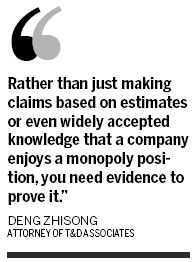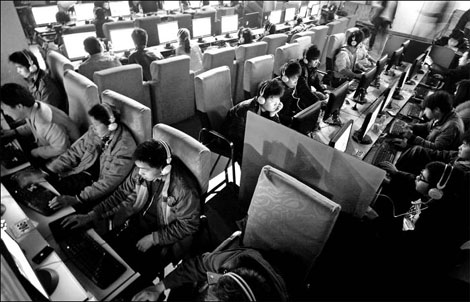Microsoft sues Internet cafe chain
|
To reduce costs and offer lower rates to customers, many Internet cafes in China use pirated software. An Xin / China Daily |
Alleges illegal Windows XP on estimated 5,000 computers
Software giant Microsoft has filed suit against Tonecan Network Communication Co Ltd, operator of an Internet cafe chain in Guangdong province, for illegal use of its Windows XP operating system.
With an estimated 5,000 computers, Toncecan is reportedly the largest Internet cafe operator in the manufacturing and outsourcing city of Dongguan.
Compensation claims by Microsoft filed with the Dongguan Intermediate People's Court rose from 600,000 yuan to 1.58 million yuan just a day before the original court date of May 12. The court decided to postpone hearing the case to allow "enough time to collect evidence".
If Tonecan loses the lawsuit, more Internet cafe operators might receive letters from lawyers, industry insiders predicted.
In a previous attempt to resolve the dispute out of court, Microsoft and the Dongguan Internet service association asked Internet cafe owners to sign up for standard purchase terms on Microsoft products last year. They said they want to eliminate the use of pirated Microsoft software in five years, local media reports.
According to the plan, a cafe with 200 computers would pay Microsoft nearly 870,000 yuan for Windows X as well as server and office software.
Royalties paid by more than 1,000 Internet cafe owners across the city would surpass 100 million yuan in total, which is viewed by owners as a heavy blow to the industry, forcing one fourth to one third of the Internet cafes to close.
Many Internet cafe operators say they cannot afford the price, Guangdong-based Nanfang Daily reports.
Widespread use of home computers and free wireless outlets have put an end to the golden days of Internet cafes, which have had to reduce costs and offer lower rates to attract customers.
After three rounds of negation between Microsoft and local industrial representatives, both sides failed to reach a compromise on the price for legal, licensed software.
Microsoft has investigated 26 local operators and collected infringement evidence during the past two years, while promoting its plan for legal products
"We are all concerned about the case," said Yuan Weide, president of a local Internet cafe association. "I feel that (Tonecan) will probably not win."
Open to doubt

Defendants in such cases often cite Microsoft's "monopoly position" and "overpricing".
During the negotiation, Microsoft offered legal software at 980 yuan for the first computer and 580 yuan for each additional machine, Tech.sina.com cited Tonecan boss Huang Peihong as saying.
The Windows XP family edition is just priced a just over 300 yuan and prices to OEM computer makers are even lower, Huang said.
Huang said the two editions - XP pro and family - are similar in function yet carry a huge price differential.
Microsoft could have used technical means to forestall or curb piracy, but it has tolerated piracy to expand the market for its products, nddaily.com, a southern metro daily news website, cited Huang as the saying.
"It waits until users are accustomed to using pirated products to file a claim for infringement," Huang said.
It is not improper for Microsoft to initiate legal proceedings against unauthorized commercial use of its copyrighted software, Li Guofu, an intellectual property lawyer said in his own blog.
Deng Zhisong, an attorney of T&D Associates, said it is a common way to maintain intellectual property rights.
"Laws do not prohibit a monopoly that results from natural market competition. Only if it abuses its dominant market position is the company suspected to violate the anti-trust law," Deng told China Daily.
"Not to mention it is a complicated process to establish whether a company has a monopoly. You have to define a relevant market and its scope to determine how much influence the subject company has over the market."
Deng cited a recent case against Baidu, the largest Chinese search engine, in which the court ruled there was insufficient evidence to prove the portal had a monopoly position.
"Rather than just making claims based on estimates or even widely accepted knowledge that a company enjoys a monopoly position, you need evidence to prove it."
Unreasonably high prices are a benchmark used in the anti-monopoly law, he said. Factors as such as costs and the market price of similar products should be taken into consideration in judging whether transactions are unfairly priced, he noted.
The National Development and Reform Commission, the nation's top economic planner, is formulating new regulations to specify what situations constitute unjustified overpricing, according to Deng.
'Education is key'
In late April, Microsoft prevailed in a legal action against Dazhong Insurance in Shanghai and received 2.17 million yuan in damages, the highest compensation it has to date been granted by Chinese courts.
The global software giant also won a sweeping victory last August in a lawsuit against Tomato Garden, a website that generated advertising revenues by offering free pirated software.
Four men were sent to prison and levied heavy fines for distributing counterfeit versions of Microsoft's Windows XP and other computer programs over the Internet.
Sun Jiandong, general manager of market strategy for Microsoft's operations in China, said at a recent news conference that the company will reduce damages from piracy by educating users, improving anti-piracy technologies and collaborating with law enforcement.
Planting the idea of using copyrighted products is the most important, he stressed.
Comparing use of pirated software to having false medicine, Sun said that malicious programs or harmful information planted in counterfeited software would do immeasurable damage to users. "But it still takes time for users to come to realize it."
Microsoft has launched a cooperative program in southwestern Yunnan province, which enables more than 200 local Internet cafes to install copyrighted Microsoft programs.
About 500 million people across the world use Microsoft products and Chinese users, including those using pirated software, are estimated to account for one fifth of the global total, according to Sun.
A research report on China's software industry piracy rate, which is released by chinalabs.com, shows that the piracy rate has dropped to 45 percent in 2009 from 47 percent in 2008.
China Daily
(China Daily 05/20/2010 page17)
















